#ArtEZ University of the Arts
Explore tagged Tumblr posts
Text
ArtEZ fashion Design BA 2nd year - Photographic Image visual interpretations of B-Project Vol.4
2 notes
·
View notes
Text






Paintings by Leyli Rashidi Rauf (Iranian)
Born in 1986 – Tehran.
(2004) Diploma in Painting. Modarres Art School
(2010) B.A in painting . Shahed Art University
(2022-2023) Student of ArtEZ University in International Master Artist Educator.
rashidi.com/
11 notes
·
View notes
Text
youtube
The Obscene Onzini! My finals animation for ArtEZ University of the Arts! The whole thing is available right here ;) I'm excited to keep creating things!
#short film#animation#comedy#humor#youtube#finals#artEZ#The Obscene Onzini#Onzini#2d animator#2d animated film#Youtube
6 notes
·
View notes
Text











Marlies Dekkers
Jos Arts, design Mariola Lopez
Artez Press, Arnhem Netherlands 2008, 144 pages, 12x16,4cm, ca. 100 b/w and colour illustrations, paperback, ISBN 9789089100429
euro 20,00
email if you want to buy [email protected]
For Marlies Dekkers, lingerie is not just underpants or a bra, it is above all an expression of women's increased self-confidence. Already in her first designs, such as the bare bottom dress and the spider web bra, Dekkers does away with the image of willing women who dress up in cute lingerie in order to please the man. Dekkers' visual language is just as radical as the underlying idea. Ruffles, bows and lace, traditionally the standard ingredients for erotic lingerie, are completely taboo in her work and make way for clean lines, ingenious straps and refined openings in unexpected places. Giving women back their self-confidence and making them proud of their own bodies, whether they are sixteen or sixty-six, is Marlies Dekkers' main motivation.Marlies Dekkers provides insight not only into the designer's motivations, but also into her style and sources of inspiration, her ambitions and the way in which she managed to develop a one-man business in the attic into a real multinational. Writers and thinkers such as Baudelaire and Bataille; filmmakers like Greenaway and Kubrick; painters such as Gainsborough and Fragonard; Delft Blue, flowers and plants.They are all part of Dekkers' universe and contribute to the creation of an oeuvre with a completely unique look.Marlies Dekkers is an ideal introduction to the designer's life and work. For anyone who wears her lingerie, is interested in Dutch fashion, is following a fashion course or wants to read about one of the Netherlands' most successful women.
25/12/23
2 notes
·
View notes
Photo
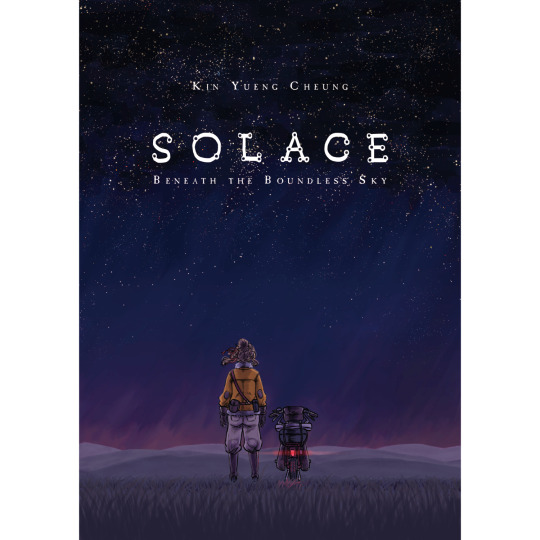
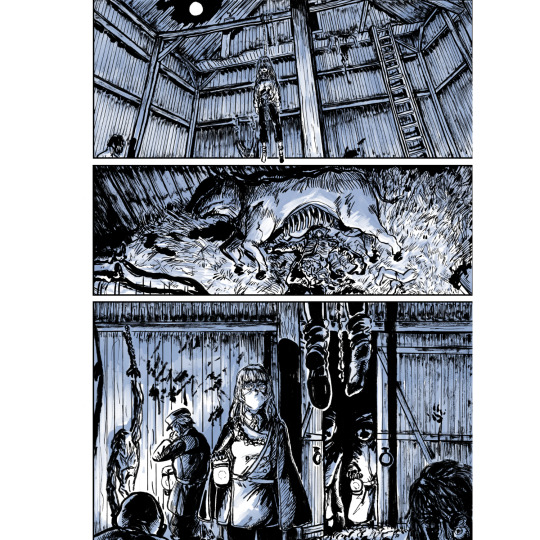
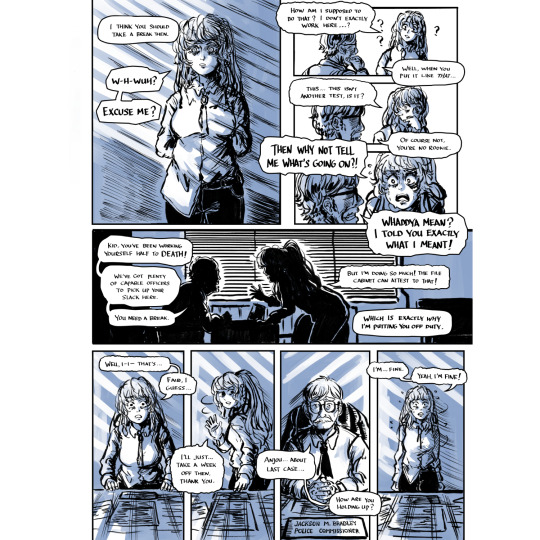
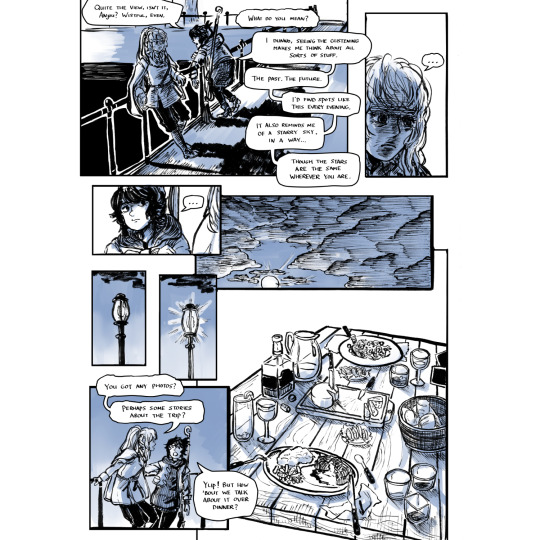
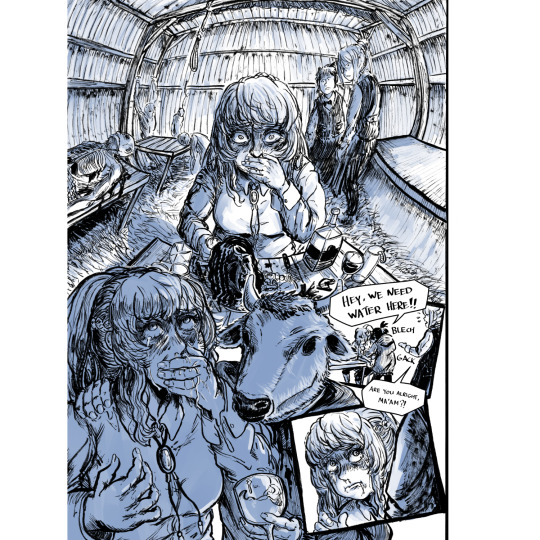

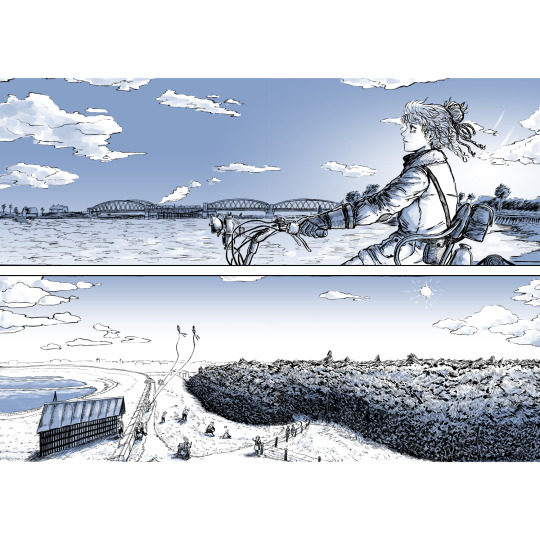

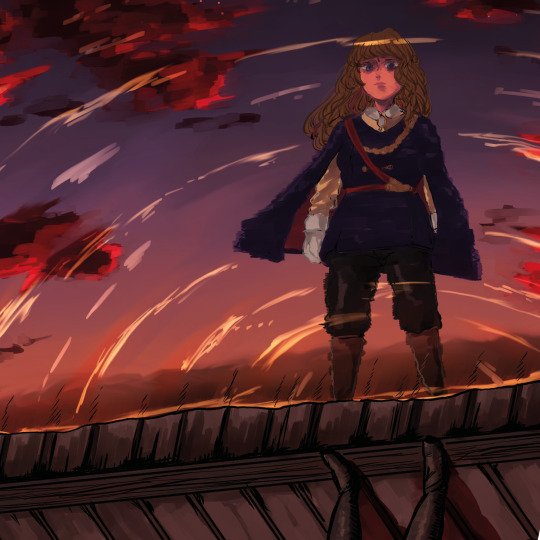
Hi everyone. I've been given the green light to graduate soon from ArtEZ, University of the Arts under the Comic Design program. Over the span of the past half year after some mandatory research, I made a 24-page short story, SOLACE – Beneath the Boundless Sky – . It's inked traditionally and edited further digitally but ultimately meant for print. "An overworked detective named Anjou is put on vacation in the aftermath of a traumatic mass murder case. While she struggles with her bottled up feelings, she encounters her friend and confidant Lizi, but Anjou is unable to speak about it. Her situation turns ugly once she recalls the first sight of her experience. Unable to cope, she wanders around aimlessly, away from home. SOLACE – Beneath the Boundless Sky – takes a look at the human side of a detective." I was torn between uploading the shoddily-translated French version I had made for my submission for a competition hosted by @prixbdraymondleblanc or the original English version.
3 notes
·
View notes
Photo

Part of my exhibition. Just simple pictures, on a very LMP project; the usual. (at ArtEZ University of the Arts) https://www.instagram.com/p/CpBYKn-L94B/?igshid=NGJjMDIxMWI=
0 notes
Text
Participants
Initiative, coordination
Professorship Theory in the Arts, ArtEZ University of the Arts (https://www.artez.nl/en/research/professorship/theory-in-arts) Dr. Peter Sonderen, responsible professor Joep Christenhusz, MA, project leader
Artistic Researchers
Budhaditya Chattopadhyay (IN, NL) (https://budhaditya.org/) Yolande Harris (UK, US) (https://www.yolandeharris.net/) Teemu Lehmusruusu (FI) (https://teemulehmusruusu.com/) Lia Mazzari (IT, UK) (https://liamazzari.com/)
Project partners
Zone2Source, international platform for art, nature and technology (https://zone2source.net/en/home-2/) Rijksmuseum Twenthe (https://www.rijksmuseumtwenthe.nl/)
Educational partners
Honours Lab, ArtEZ University of the Arts (https://www.artez.nl/en/research/honours-lab)
0 notes
Video
vimeo
GRADUATION FILM ARTEZ FASHION DESIGN ARNHEM 2021 shot at Allard Studios Amsterdam on June 1, 2 & 3 - 2021 Creative director Diek Pothoven Director of photography Niels Zweekhorst Creative producer Rachid Naas Editor Claudio Zaia Post-production SOLD! Studio Music director Jelle Hoekstra Hair powered by Redken Make-up by House of Orange copyright © 2021 ArtEZ University of the Arts
4 notes
·
View notes
Text

meet ✨GENERATION 66✨ ArtEZ Fashion Design BA graduation year 2024 generation 66-image by Luisa Haddad Zavadinack
2 notes
·
View notes
Photo

In the coming days I will be sharing pics I took of Artez Fashion Shows 60th Edition 2018-Musis-Arnhem . . . . #artez #artezfashiondesignarnhem #fashiondiaries #fashionshow #fashiondesign #fashiondesigner #model #dutchmodel #fashionphotography #fashionphotographer #makeupartist #musis #arnhem @modelcitizenmag #canon5d #canon_photo @artezfashiondesignarnhem #bestcitybreaks #bestofnetherlands #graduation #arts #ba #university #students #fashionblogger #womenswear (at Arnhem, Netherlands)
#model#arts#fashiondesigner#fashionphotographer#womenswear#arnhem#students#artezfashiondesignarnhem#bestofnetherlands#artez#bestcitybreaks#makeupartist#fashionblogger#canon_photo#fashionshow#graduation#dutchmodel#ba#canon5d#university#musis#fashiondiaries#fashionphotography#fashiondesign
1 note
·
View note
Text
Beasiswa S1 - S2 ke Belanda
Beasiswa S1 – S2 ke Belanda


Ada skema beasiswa lain yang ditawarkan Pemerintah Belanda yang tidak saja ditujukan bagi warganegara lokal, tapi juga mancanegara (di luar Kawasan Ekonomi Eropa). Holland Scholarship. Beasiswa tersebut dapat dipergunakan untuk studi S1 atau S2 di universitas-universitas Belanda.
Beasiswa Holland dibiayai oleh Kementerian Pendidikan, Budaya dan Ilmu Pengetahuan Belanda bekerja sama dengan…
View On WordPress
#Aeres University of Applied Sciences#akomodasi di belanda#Amsterdam University of the Arts#Amsterdamse University of the Arts#ArtEZ Institute of the Arts#beasiswa belanda#Beasiswa Erasmus Mundus Eropa#beasiswa eropa#beasiswa ke belanda#beasiswa ke eropa#beasiswa ke university of twente#beasiswa kuliah ke belanda#beasiswa kuliah ke leiden university#beasiswa luar eropa#Beasiswa S1 - S2 ke Belanda#beasiswa S1 di belanda#beasiswa S2 di belanda#Beasiswa S2 di Leiden University#belajar di belanda#Belanda#Biaya Hidup di Belanda#Breda University of Applied Sciences#cara kuliah di eropa#Codarts Rotterdam#Delft University of Technology#Driestar educatief#erasmus university rotterdam#Eropa#Fontys University of Applied Sciences#Gerrit Rietveld Academie
0 notes
Text
Top Reasons to Study in Netherlands
The Netherlands is known for its renowned standard of education and comparatively low cost of living. Also, many Dutch universities offer grants and scholarships that can reduce or fully cover the tuition fees of study programs. Dutch universities are among the best universities in the world. The Netherlands is one of the top non-English speaking countries where you can study abroad, get Quality education & Degrees taught in English.
Types of programs in Netherland Universities Dutch degrees & qualifications The following degrees are available in the Dutch system which does not differ much from the European system.
Bachelor’s Degree (BA, BSc, BEng): 3-4 Years
Masters Degree (MA, MSc, MEng): 1-2 Years
Ph.D.: 4 Years
Postdoctoral research
There are primarily three different types of institutions. Research Universities, Universities of Applied Science Institutes for International Education. Certain degree levels are only available from each institution type. Bachelors: Available at Research Universities and Universities of Applied Sciences Masters: Available at all Institution types PhDs: Available only at Research Universities Admission Requirements- Dutch credit system (ECTS scheme) The study workload is measured in ECTS (European Credit Transfer and Accumulation System) credits. Student workload is the notional time an average student needs to achieve the objectives of a program. This includes lectures, seminars, assignments, laboratory work, independent study, and exams. The ECTS credit system is used to evaluate different universities, programs, courses, modules, dissertations, or even students’ qualifications. Credits are awarded after the completion of the program.
Entry requirements for universities in the Netherlands The first step is to contact the international office of the university you are interested in to check whether your degree (obtained in your homeland) is recognized in the Netherlands. Once your degree is recognized in the Netherlands, you may need:
Residence permit if you are not an EU / EEA or Swiss citizen.
English Language Score: TOEFL (minimum 550 paper-based, 213 computer-based), IELTS (minimum average of 6) GMAT or GRE.
A minimum average of 7 - 7,5 (foreign diploma).
Institutions may reject your application or ask you to take some admission tests if they believe you are not fully qualified.
Most universities may also offer you courses in Dutch as a second language so you can prove that you have sufficient mastery of the language.
Required average scores vary depending on university and major. Note that for some programs, the number of applicants is much higher than that of available places - in this case, a selection procedure takes place.
Top Universities in the Netherlands
Amsterdam University of Applied Sciences
ArtEZ University of the Arts
Breda University of Applied Sciences
Delft University of Technology
Eindhoven University of Technology
Erasmus University Rotterdam
Global School for Entrepreneurship
Hanze University of Applied Sciences, Groningen
Hotelschool The Hague
HU University of Applied Sciences Utrecht
Leiden University
Maastricht University
Nyenrode Business University
Radboud University
Rotterdam University of Applied Sciences
Stenden University of Applied Sciences
The Hague University of Applied Sciences
Tilburg University
University of Groningen
University of the Arts, The Hague
University of Twente
Utrecht University
UvA University of Amsterdam
VHL University of Applied Sciences
VU University Amsterdam
Wageningen University & Research
Windesheim University of Applied Sciences
Cost of Studying in the Netherlands The cost of study at Dutch universities and other higher education institutions depends on a student’s nationality. University fees for Dutch and EU students For students from the Netherlands, other EU/EEA countries, Switzerland or Surinam, the cost of study at Dutch universities and higher education institutions are mostly covered by the government. However, these students are required to contribute a statutory tuition fee an annual amount of around 2.000 euros, set by the government. University fees for non-EU students in the Netherlands For non-EU students study costs are usually higher when coming to the Netherlands. This amount depends on the institution, the degree, the student’s residence permit type, whether they have studied before, and if they have obtained a scholarship. To know the exact amount, it’s advised to research costs directly with the institution of your choice. Private school costs in the Netherlands Private schools such as business schools, run bachelor and MBA programs with tuition fees ranging from roughly 16.000 to 36.000 euros for a complete program. Student Financing in the Netherlands The Dutch government also has a student financing system to assist students with paying for their study and living costs, including public transport. What it comprises exactly depends on what you study. Student financing is available to Dutch students, however, non-Dutch students are sometimes also eligible if they have EU citizenship or a type II, III, or IV residence permit. Additional costs while studying Extra costs that need to be taken into consideration include: Visa and residence permit fees. Travel costs to arrive in the Netherlands. Accommodation in the Netherlands (e.g. short stay, room, apartment, student housing, etc.). Dutch health insurance depending on where you are from and how long you are staying. Study materials such as textbooks or equipment. Travel costs to places such as shopping, using public transport, and leisure activities. Students are often eligible for discounts at many bars, restaurants, museums, and cinemas. Study costs are tax-deductible If case you are working while studying in the Netherlands, you can deduct study costs on your annual income tax return. Deductible study costs include: Programs and degrees such as an MBA, Master’s, Bachelor’s, MBO, or certain personal development courses Textbooks A computer Study materials such as specialized software or equipment Note- Language courses, travel costs, and accommodation are not deductible.
The Netherland’s Student Visa Process The Holland student visa process for a Non –EU student is as below. Provincial Residence Permit- MVV, officially known as Machtiging tot Voorlopig Verblijf (MVV). This is also known as the permit to enter the Netherlands. The MVV is applied for on the student’s behalf by the university. MVV allows entry into the country for six months. Most of the courses at universities last for 1 to 4 years, a mere MVV will not suffice. Hence the other option is to apply for VVR. VVR or a Residence Permit -once you enter the country, you need to apply for VVR or a Residence Permit. The VVR is also applied for by the host university. VVR is valid for the duration of the program and is permitted only for study purposes the student had enrolled in. There is another condition attached with the validity of VVR. It stays valid provided the student scores 50% of credit throughout the course duration. As the Netherlands is a part of the European Union, international students from the EU or EEA get special privileges and have different requirements. They require neither the MVV nor VVR for studying in the Netherlands. Such students have to simply request their host institutions to register them with the immigration authority. For students from the USA, Canada, Vatican City State, Monaco, South Korea, Japan, Australia, and New Zealand, only a VVR is required. Requirements for Student Visa for the Netherlands For the successful grant of a student visa for the Netherlands, you must submit these compulsory documents:
Valid passport
Sufficient financial Proof -means validating that you will be able to support yourself financially during your stay. These include either or all transfer of funds, bank statement, and scholarship letter.
Letter from the university you have chosen confirming your admission or enrollment
Proof of payment for all required legal fees
Health insurance
NUFFIC-certificate, a requirement only for Chinese students
Other document requirements are:
Completed application form
Two photographs meeting the officially specified conditions
Birth certificate
Academic transcripts
Insurance Requirements Netherlands student visa requirements-students are required to have valid health insurance to bear their medical expenses in the Netherlands if required. For non-EU, non-EEA, and students from Switzerland, their EU Health Insurance Card should be sufficient. For those working in the Netherlands, it is compulsory to take the Dutch basic healthcare insurance. Keep this in mind if you intend to work part-time during your course. Students should find out from their host institution for details on health insurance requirements and references for an insurance company. Many private companies also offer special insurance packages for students. Some other insurance options are not required but are strongly advised. Personal liability insurance is for insuring you against costs incurred by you in case of damage to someone or their property. Repatriation insurance should also be considered. It covers you against the transferring cost incurred if a serious medical condition requires returning you to your home country. Household contents insurance covers you against any unfortunate damage to your house due to fire, water damage, and theft, among others things.
Top Courses in the Netherlands
Systems Thinking for Sustainability: Complex Systems Analysis Course - Except Integrated Sustainability
International Bartender Course.
Short Course in Social Media and Online Marketing.
Sustainable Urban Development.
Data Analytics Bootcamp Course.
Try Entrepreneurship in 90 Days.
Literature and Society. Bachelor Degree.
Economics and Business Economics. BSc.
Double Bachelor BSc² in Econometrics and Economics. BSc.
Management & Leadership. MA.
Marketing Management - Digital Business Concepts. Bachelor Degree.
Horticulture & Business Management.
International Tourism Management.
Work while studying in Netherland Many students choose to work while pursuing their education in the Netherlands. It depends on their nationality, if students may work for up to sixteen hours a week with a work permit from their employer. EU/EEA/Swiss nationals are allowed to work in the Netherlands as many hours as they choose while studying. Internship Opportunities in Netherland Internships and industrial placements will only be arranged for students if they are included in the program being followed, however, these can be full-time, and there is no limit to what a student may earn. It is expected for students to earn between 6 and 10 euro per hour for part-time work they find themselves.
Career Opportunities in Netherland Careers in Holland offers the best international recruitment solution for jobs in Holland in IT, engineering, high tech, and science on BSc, MSc, and Ph.D. levels Holland has fast-growing industries and is a key player in the business world. The sectors offering great employment opportunities in Holland include agriculture and food, creative, chemicals, energy, high-tech systems and materials, horticulture, life sciences, and health, logistics, and water. Large Dutch multinational companies include:
Philips
KLM
Shell
ING Bank
Unilever
There are lots of opportunities for ex-pats to work in the Netherlands. The Netherlands is home to a wide range of international and multinational companies; Dutch internationals include ING Group, Royal Dutch Shell Group, Unilever, Philips, and Heineken. The Netherlands has a relatively stable economy backed by a number of foreign investments encouraged by advantageous tax conditions. The country also has a diverse, well-educated population, almost 24% of whom are foreign or ethnic minorities. Jobs in the Netherlands
The country is a world leader in agriculture, beaten only by the USA in terms of food exports. Its top commodities include:
machinery
electrical equipment
mineral fuels
pharmaceuticals
medical apparatus.
POPULAR GRADUATE JOBS
Agriculture
Energy
Finance
Healthcare
Transport and logistics
According to iamamsterdam.com, the average starting salary of a university graduate in the Netherlands is €2,632 per month. This can be higher, depending on your degree subject. Skills Netherland currently has the second-highest demand for engineers globally, despite its reputation as an innovative leader in high-tech engineering and technology. Other areas include:
IT sector- For rapid advances in technology
Teaching- There is a current level of trainee and qualified teachers.
The healthcare sector, which is under strain thanks to a growing population and longer average life expectancy, meaning more people than ever before are needing care.
Immigrate To Netherlands Post-Studies Holland offers visas for international students who want to stay and work after graduation. With the Orientation Year for Graduates Seeking Employment one can spend up to one year looking for work in Holland, and one can stay as long as you have that job. To apply for permanent residency in the Netherlands you have to meet the following conditions: You must have completed your five years of consecutive legal stay in the Netherlands. You must have a valid resident permit or temporary stay permit at the time of applying for permanent residency in the Netherlands.
Health Care Benefits In Netherlands People who live in The Netherlands may be entitled to a healthcare allowance. This benefit helps to cover the monthly premium payment for Dutch health insurance. Expats or students that are (temporarily) working in The Netherlands can also apply for the healthcare allowance. Requirements for Dutch healthcare allowance You need to meet the following conditions: You are at least 18 years old. You have Dutch health insurance. You have an EU nationality, a valid residence permit, and/or work permit. You earn below a certain level Your assets are less than a certain amount Income requirements for healthcare allowance Ex-pats majorly whether or not entitled to receive a healthcare allowance will depend on their income. The Dutch tax authorities make a distinction between being single and having a household with two incomes:
Public Transport Systems in the Netherlands Public Transportation Consists of a variety of Modes, such as: Cycling- Cycling is an easy mode of transport in the Netherlands. 27% of all trips are by bicycle- the highest modal share of any country in the world. Rail Transport- Most distances traveled on Dutch public transport go by rail. Like, the Netherlands has a dense railway network, between 7,021 kilometers (4,363 mi) and 7,300 kilometers (4,500 mi) of the track. Public Transport- Long-distance buses are limited to a few missing railway connections. Regional/rural public transport, serving small(er) towns is by bus. Local/urban public transport is also generally by bus, but the three largest cities (Amsterdam, Rotterdam, and The Hague) all have extensive tram systems, that in each case also connect with adjacent cities in their respective urban agglomerations Public Transportation Consists of a variety of Modes, such as:
Buses.
Cable cars.
Commuter trains.
Monorails and tramways.
Light rail.
Subways.
Streetcars and trolleys.
Taxi.
Vanpool Services
Ferries and Water Taxis
Water Transport- The Netherlands has thirteen seaports, three of which have international significance. Education Facilities in Netherland The education system in the Netherlands works very well, but it is very different from most other countries. Schools following particular religious or pedagogic principles have had equal state funding to public schools since 1917.
Education in the Netherlands Most children start primary school (called basisschool in Dutch) the day after their 4th birthday; whenever that is throughout the year. From their 5th birthday, all children are obliged to go to school Pre-school education in the Netherlands Before a child reaches primary school age, he/she could go to daycare or preschool, or a combination of the two. Daycare is meant for children from about 10 weeks up to 4 years old. Most daycares only offer full-day contracts for 1 to 5 fixed days per week. In most cities, preschool starts at age 2 and is offered for an average of 15 hours per week, spread out over three days. Primary education in the Netherlands In the Netherlands, there is a distinction between an open bar and bijzondere schools. The openbare schools are both funded and run by an independent foundation that was originally set up by the government. They are always non-religious. About two-thirds of the population attend bijzondere (special) schools, which have their board and often follow particular religious or pedagogic principles. Secondary education in the Netherlands It has three levels of high school education, which go by the acronyms of VMBO, HAVO, and VWO. Here is a summary of them all: VMBO – It is preparatory secondary vocational education, usually takes four years, and is followed by MBO, HAVO – It is the senior general secondary education, takes five years, and is followed by HBO (Hogeschool/University of Applied Sciences); VWO – It is pre-university education that takes six years, and students can continue to university (WO). Higher education in the Netherlands Since most employers ask for qualified employees, students are highly encouraged to obtain a diploma. After the above-mentioned types of secondary school, students can continue with many different types of higher education. Bachelor and masters programs Some HBO institutes also offer a master’s program, for which you often need to have some relevant work experience. You can also do your bachelor’s at HBO, followed by a master’s at university. With the certificate of your first year of HBO (propedeuse), you may also continue your education at university. Education costs and funding Municipalities sponsor parents who cannot afford the voluntary parent contribution at the government-funded schools. They can also get a contribution towards after-school activities and other costs related to raising children. Some companies pay for the international education of the children of their employees, and sometimes these fees are tax-deductible. It is a good idea to ask your HR department if this is the case.
How We Help Our experienced consultants will guide you throughout your journey in pursuit of higher education and admissions into your dream universities/colleges. In specific but not limited to, following areas of assistance is provided by our consultants:
Complete Profile Evaluation
Guidance on curriculum and subject selection for high school (A levels, IB, IGCSE etc)
STEM Coaching - Physics, Chemistry, Biology, Business, Maths, Economics, English and many other subjects
Preparation of different standardized tests - Undergraduate and Postgraduate
Helping you to build your profile by guiding you on leadership skills, co-curricular activities, internship, online courses etc.
Shortlist and finalize the best-fit college / university
Research the right programs / courses for students
Craft academic CV
Brainstorm ideas for essays and personal statements
Draft pointers for recommendation letters
Scholarship and Financial Aid guidance
MMI and Panel Interview Preparation
Submission of the application form
Follow up with the universities and updating the status of the applications
Visa assistance and guidance
Assistance on safe accommodation options
Pre-Departure Guidance
GotoUniversity is the best study abroad consultants. We have been providing free admission counselling, application services and consultancy services all over world for career counseling and admission guidance. If you are looking for University Of Amsterdam, visit our site.
1 note
·
View note
Photo


Iris van Herpen (born 5 June 1984) is a Dutch fashion designer. Van Herpen started her fashion label in 2007. She is a guest member of the Parisian Chambre Syndicale de la Haute Couture, part of the Fédération française de la couture. Van Herpen has shown her collections at the Paris Fashion Week since January 2011. Van Herpen's work has been included in the Metropolitan Museum of Art, the Victoria & Albert Museum, the Cooper-Hewitt Museum in New York and the Palais de Tokyo in Paris. Much of her work has been characterized as belonging to the subfield of fantasy couture. She attended the Preparatory Course Art & Design at ArtEZ University of the Arts in Arnhem. During her high school years, she became particularly interested in designing clothes. She studied Fashion Design at ArtEZ, interned at Alexander McQueen in London and Claudy Jongstra in Amsterdam and graduated in 2006. In 2007, she started her own label focusing on women's wear collections. For this reason, Van Herpen prefers interdisciplinary research and collaborations with other artists. She is a pioneer in utilizing 3D-printing as a garment construction technique, and an innovator using technology as one of the guiding principles in her work.
Herpen’s work cannot simply be defined as fashion design, in fact it transcends beyond the world of fashion and expresses other forms of art. She continuously experiments with unconventional materials, innovative techniques and advanced technologies. At first, she had started off using fabrics in her work, however it limited her from sculpting, building and constructing new structures and forms. Thus she added various atypical materials to her list for usage to create her extraordinary designs. Taking this to consideration, it is not astonishing that the words ‘sculpt’, ‘sculpture’ and ‘sculptural’ are used when referring to her work. However, these works of art not wearable, they only please the eyes and reproduce the designer’s concept. Her designs function when they equally interact with the human body and the two complement, complete, follow and transform each other. In Harpen’s designs ‘movement’ plays an essential role and it is highly important to analyze and judge how the body and the design change and behave together during any sort of motion.
if you want to support this blog consider donating to: ko-fi.com/fashionrunways
148 notes
·
View notes
Text
Starry Night

My all-time favorite painting, 1889, Van Gogh
Not only do I love this painting for it’s dreamy and heavenly vibe, it is also pulled entirely out of Vincent’s imagination. In contrary to his previous work, which he made to perception, this piece makes a noticeable break from his usual works. Besides, it would seem as if he made a division in the way he painted the sky and in which he made the town below. notice the swirly and organic brush strokes from the heavens, rolling around the stars and having the beautiful colors dancing in the sky. All this majesty in contrary to the straight up and down painted houses. However, notice how the church tower reaches over the hills and trees and ends in the sky? Van Gogh brings God to the village.
-- --
For our first art-history class at ArtEz University of the Arts, the whole class was asked to introduce themselves with the help of a specific artwork. Vincent’s Starry Night was mine. I have been in love with watching the stars ever since I was little, I am a Christian and I love the way Van Gogh presents the heavens in this painting and how he seems to connect the town to the sky by using the church.
4 notes
·
View notes
Photo

If only we were grey. Theatrical performance of understanding the roles and labels within the society of white hetero normative narrative, and the acknowledgement of being queer in that space. (at ArtEZ University of the Arts) https://www.instagram.com/p/CopJKxAr5NZ/?igshid=NGJjMDIxMWI=
0 notes
Text
City Lab
Seminar 1: Rethinking the City.
Wednesday 9th December
3pm – 5pm
3pm – Introduction to The City Lab Seminars: John Byrne
3.10 – Alessandra Saviotti – The DPI Toolkit Explained
3.40 – Owen Griffiths – Landscapes of Resistance/Owen’s City Lab
4.10 – Jo Marsh - Ty Pawb, Wrexham’s Arts, Markets and Community Hub
Further Information:
In this first/opening City Lab Seminar we will be joined by three key thinkers and practitioners who are actively using the city as both a context and a tool for social change.
Each contributor will speak for 20 minutes, followed by a 10 minute opportunity for questions. There will also be time for further questions and discussions at the end of the presentations.
Ideas and themes that emerge from this first City Lab Seminar will be picked up again early next year (date to be announced) when all three panellists will join us for individual discussions/seminars as a first ‘open access’ point of the TPG shared module ‘Transdisciplinary Pracitce’.
Information on Speakers/Contributors:
Alessandra Saviotti (LJMU School of Art and Design / Asociación de Arte Útil)
Weblink: www.arte-util.org
Alessandra Saviotti Presentation: DPE Toolkit Explained - Alessandra will talk about the DPE's Toolkit section in particular on the idea of usership within the education context. Alessandra will address this question: is it possible for art to infiltrate the formal education environment in the form of a radical teaching approach that seeks to give a new shape to the existing configuration of the system, within the system itself?
Alessandra Saviotti Biography: Alessandra is a curator and educator who lives in Amsterdam. Alessandra is also a PhD candidate at the Liverpool John Moores University - School of Art and Design. Alessandra’s focus is on socially engaged art, collaborative practices and Arte Útil. Her work aims to realize projects where the public becomes a co-producer in the spirit of usership. Her reflection is taking into consideration collaborative processes according to the motto ‘cooperation is better than competition’. She is a co-founder of the art collective Aspra.mente (2006-2016), a group which focuses on the common definition of ‘work in progress’, seeking the contribution of operators in other fields than art for interdisciplinary projects that are free from time constraints. Alsessandra was part of the curatorial team of the 'Museum of Arte Útil' at the Van Abbemuseum (Eindhoven, NL) and since 2014 she has been collaborating with the Asociación de Arte Útil especially aiming at emancipating the usership around the Arte Útil Archive. She led online and offline seminars at the San Francisco Art Institute (2017), California College of the Arts (2017), SALT (2018), The Whitworth (2019), Chicago Architecture Biennial (2019), Accademia di Brera (2020), and she was the coordinator of the Escuela de Arte Útil at Yerba Buena Center for the Arts, San Francisco (US). She currently teaches at ArtEZ - International Master Artist Educator, Arnhem (NL) and she is a tutor at Accademia Unidee, Biella (IT). Since 2007 Alessandra has also been working in collaboration with several institutions such as SFMOMA (US), MAXXI, Rome (IT), Delfina Foundation, London (UK), Middlesbrough Institute of Modern Art (UK), Visible Project (IT), Manifesta 7 (IT), UNIDEE – Cittadellarte (IT), SALT (TR), Estudio Bruguera (USA) e Studio Grilli (BE). She is a 2013-14 van Eyck Akademie fellow, a 2015 Mondriaan Foundation grantee and a 2014 Demo Movin'Up grantee and she has been awarded an international mobility grant from i-Portunus – Creative Europe in 2019.
Owen Griffiths (Artist & Curator: Founder / Director Ways of Working- a locally engaged social enterprise). Owen is based in Wales.
Weblink: www.aboutreconnection.com
Owen Griffiths Presentation: Owen’s City Lab:
Owen will talk about his work as a series of landscapes of resistance - an emerging archipelago of collaborative project in civic spaces across the city of Swansea. Owen is interested in long term work, overlapping edges, social economic model santi gentrification and empowerment. His research is based around, collaboration, food and systems of land use and alternative ownership seeded through collaboration and social justice.
Owen Griffiths Biography:
Owen Griffiths is an artist, workshop leader and facilitator. Using participatory and collaborative processes, his socially engaged practice explores the possibilities of art to
create new frameworks, resources and systems. This takes many forms, but includes reclaiming and rethinking events, rituals and spaces of dialogue. Griffiths explores climate, landscape, urbanism, social justice, food systems and pedagogy, creating projects and events that prepare us for the gentle work of the future.
He is interested in working locally and in long term dialogue with communities and projects. These long-term dialogues make a case for slowing down time, rethinking the expectations around participation to model new collaborative methods which raise questions around equity, empowerment and sustainability.
In 2020 Griffiths developed Ways of Working a new community participation platform and company in order to work in ways he feels are urgent; speaking to climate crisis, localism and radical collaborative projects.
Jo Marsh (Creative Director at Ty Pawb), Wrexham’s Arts, Markets and Community Hub.
Weblink: https://hes32-ctp.trendmicro.com:443/wis/clicktime/v1/query?url=https%3a%2f%2fwww.typawb.wales&umid=26848098-e77f-414c-a12b-2449a4ca4efe&auth=768f192bba830b801fed4f40fb360f4d1374fa7c-d5eaefcbd2ec131e42ae96d121134efa26351191 and/or https://www.theguardian.com/artanddesign/2018/sep/01/ty-pawb-review-art-gallery-everybodys-house-wrexham-market
Jo Marsh Biography:
After graduating in 2009 Jo worked as a freelance artist for a few years, this included lots of gallery education work in Wales, some in France and at the Design Museum in London. In 2011 Jo won the Leeds based Woolgather Art Prize, with my project ‘With Love From The Artist’ that had developed from my side hustle as an itinerant market trader https://hes32-ctp.trendmicro.com:443/wis/clicktime/v1/query?url=www.withlovefromtheartist.com&umid=26848098-e77f-414c-a12b-2449a4ca4efe&auth=768f192bba830b801fed4f40fb360f4d1374fa7c-514d3850b6845bcd75526d65f4321d8d79885aa5.
In 2013-14 Jo was funded by Arts Council Wales to build and tour a travelling gallery called WanderBox, offering residencies to artists in a wide variety of settings and locations https://hes32-ctp.trendmicro.com:443/wis/clicktime/v1/query?url=https%3a%2f%2fwww.axisweb.org%2fp%2fjomarsh%2fworkset%2f213293%2dwanderbox%2f&umid=26848098-e77f-414c-a12b-2449a4ca4efe&auth=768f192bba830b801fed4f40fb360f4d1374fa7c-5710c37b68c29a33d55e90625a283baa14a13fb9
In late 2014 Jo became the Learning and Engagement Officer for Oriel Wrecsam, leading the off-site engagement programme for three years as plans for a new arts and markets development unfolded. This off-site programme included working with young people to build a full sized Shepherd’s Hut, and working with local people to establish a makers group that met regularly and adventured round the county.
In 2017 Jo was appointed Creative Director at Ty Pawb (formerly Oriel Wrecsam and the People’s Market, Wrexham). Since then Jo have been leading a programme of exhibitions and projects that grow out of local connections, and respond to local urgencies. So far this has included building a temporary adventure playground in one of the galleries (complete with 16 tonnes of sand!), working with members from our resident mental health charity to design and manufacture lamps for sale, and establishing a nascent rooftop garden on our multistory carpark.
1 note
·
View note